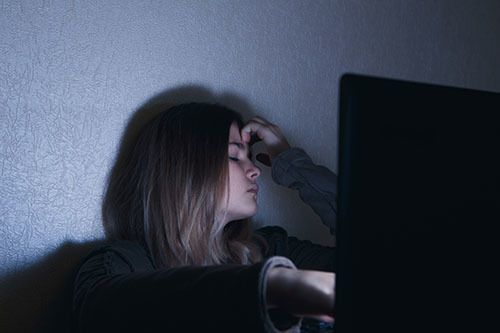How the Internet is Affecting Our Teens Mental Health
By Emily Miller

The global coronavirus pandemic has caused hardships for all of us, to be sure. Adults have been forced to reckon with losing jobs or changing to remote work styles, refraining from socializing with friends, and oftentimes reducing or avoiding visits with elderly family members. Yet even still, it is our children, especially our teenaged children, who have borne the brunt of the lifestyle adjustments required by the pandemic.
The lack of in person events has made managing emotions during difficult times even harder for teens, who often benefit from commiserating with their peers and finding support from adult mentors, teachers, coaches, and other role models outside the house. Teenage depression can creep up slowly, and with so much time spent on the internet it can be difficult for even the most attentive of parents to recognize the early signs.
In this article, we will take a look at how the internet is affecting our teens’ mental health. Then we will explore some actions parents can take to help mitigate the negative impacts and support your teens.
Affecting Sleep Cycles
Studies have revealed how too much exposure to the bright blue light emitted by computers and smartphones can have negative impacts on sleep cycles. Blue light stimulates mental activity and focus, which can be a positive feature during the day. But scrolling through social media posts or watching Youtube videos long after the sun goes down can disrupt the body’s natural circadian rhythm, making it extremely difficult for teens to quiet the mind enough to fall asleep.
Disrupted sleep patterns are one of the primary causes for mental health imbalances. If your teen is already prone to depression, anxiety, or insecurity, lack of sleep can amplify the effects of these conditions to a huge degree. A healthy sleep cycle can also help regulate eating and exercise habits, so losing sleep can lead to a vicious cycle of poor eating habits and less motivation to exercise- both of which can further augment emotional imbalances.
If your teen is truly determined to use the computer at night, try encouraging them to wear blue blocking glasses. Always set phones, tablets, and computers to the “night” bright settings, which adjust the hue and brightness towards warmer, more orange tones. This makes the bright light of the screen less harmful on the eyes and less disruptive of the circadian rhythm.
Increasing Depression and Anxiety
One of the problems that your teens may face is that spending too much time on the internet catapults them into an endless feedback loop. Much of the material that goes viral online features celebrities or influencers who emphasize conventional standards of beauty and body image. For both teenaged boys and girls, this can hit hard on their self esteem.
Internet culture encourages constant comparisons with unrealistic standards; your teens will be exposed to filtered and edited images of people’s lives which may make them doubt their own, asking questions like: Why am I not as pretty as X? Why am I skinnier than Y? Q looks so happy in every picture, why aren’t I happier?
This kind of critical self reflection against the endless influx of unvetted visual information and stimuli on the internet can lead to an internal downward spiral. Teenagers are already more prone to emotional upheavals; hormonal changes can have profound emotional effects. The teenage years mean your children are discovering sexuality, reacquainting themselves with their bodies, and navigating the awkwardness of preparing to leave the family home. Constant exposure to the internet can worsen depression and anxiety in anyone, but teens are especially prone.
How To Lessen the Negative Effects of the Internet
This year has seen a particularly dramatic example of how the internet can negatively affect teenagers. During what is often a formative period of life, our teens have had no after school sports, drama, gaming, or art clubs to attend and have been unable to attend any of the usual significant social markers like prom or graduation. They have missed out on celebrating and struggling through the ups and downs of teenage life with their peers. Instead, teens have been spending increasing amounts of time on the internet.
With school, socializing, and entertainment all taking place online in the past year, it can be difficult to cut down on internet usage. But small steps can make a huge difference in your teens’ wellbeing.
Set an internet curfew to prevent your teens from getting lost in the online world and staying up until the late hours. Ban smartphones and other devices from the dinner table. Encourage them to join in on family game nights, family movie nights, or any other activity that provides mental stimulation and a sense of connection without the screen. Schedule exercise or physical activity outings- hikes, family yoga sessions, or even remote dance classes can bring both fun and physical movement back into your teen’s life, both of which can help combat anxiety and depression.
You should respect your teens’ privacy, but equally make it clear that there are certain boundaries they too need to respect. Install cybersecurity measures on the home internet network and browsers so your teens won’t be at risk of virtual predators. And always emphasize that you are ready for open communication; if there is ever something they need to talk about, even if it is a difficult feeling they don’t quite understand.
Offline Connection
While the internet has become a vital part of everyday life, it is incredibly important to try to connect outside of the context of the screen. Whether that means more trips to the library, getting together with friends in safe outdoor spaces, or scheduling more family adventures, try to support your teen to find ways to connect with the world outside the web. These days, increasingly, even young children are affected by anxiety, so now it is more important than ever to instill healthy off screen habits in your children’s lives.











